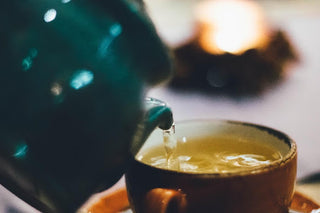Why does a barista's tea taste better than the one you make at home? Quality is what makes the difference, as aside from the tea leaf or beans they use in making the tea, baristas are also critical about the water they use as it is an essential component for brewing tea. In simple words, choosing the type of water you use is vital to high-quality tasting tea.
Anyone who loves a good quality herbal wellness tea would want it to taste good. And to get the best-tasting tea, you don't only have to be peculiar about the tea leaf or bean you use, but the water you choose and the brewing process. This article will walk you through how to make high-quality tea.
Does water impact taste?
The first thing we'd like to establish is that there are different types of water. The water you get from the tap in your kitchen differs from the spring water you buy. These two types of water differ from filtered water or well water. Each type of water has a characteristic difference in terms of odor, color, chlorine level, pH, and calcium harness, amongst others.
So, yes, the water you use in brewing tea can impact the taste because the mineral matters in the water will add to the taste and aroma of the tea. As such, it is best to be particular about the water you choose for the tea.
Which type of water to choose?
As we said, the composition of the type of water can impact the taste of the herbal wellness tea you are brewing. Below are the common choice people use.
-
Tap water
Tap water is the most commonly used type of water people use when brewing tea. It is the most abundant because it is readily available in any home with a tap. But the truth is that despite being the most convenient, it is not the best choice.
Tap water tends to have a lot of chlorine and metal. The reason is that tap water is often treated with chlorine to kill parasites and bacteria. So, when you brew that herbal wellness tea with tap water, it distorts the taste and aroma of the tea. In some cases, it may neutralize the nutrients in the tea.
-
Bottled water
Some people think bottled water is the best to brew tea because it is the most hygienic. But the truth about bottled water is that it is heavily processed. As such, it lacks many essential mineral matters.
In some cases, the manufacturer of bottled water adds some minerals. But the added mineral tends to distort the taste and aroma of the herbal wellness tea. Moreover, the plastic container storing bottled water tends to add a plastic flavor to your tea.
-
Spring water
Spring water is a natural source of water and is often encouraged. Unlike most types of water, spring water does not taste boiled or flat. It tends to contain a lot of oxygen which is great for the body and brain, aids digestion, and tastes great.
As such, it gives a great drinking experience. But the issue with using spring water to brew tea is that it contains a lot of aquifers. This tends to affect the taste of the tea when you use it to brew.
-
Filtered water
Finally, filtered water is another common type of water you can use because it is not only hygienic by tastes good. The filtration process removes several chemicals that alter the taste of the water when used to brew tea.
Additionally, it is ozonated, which makes it taste good and not flat. Generally, this type of water is best for brewing herbal wellness tea, as it does not impact the taste or aroma of the tea.
What is the best kind of water to use for making tea?
The best kind of water to use for making tea is filtered water. The reason is that filtered water is neutral, meaning it is neither alkaline nor acidic. Also, filtered water tastes fresh and is well-oxygenated, which helps draw the flavor out of the tea. And because the water is filtered, it does not contain high levels of mineral matter like calcium or chlorine.
When brewing tea, it is best to be particular about the type of water you choose. While filtered water is the best to use, at the end of the day, it all depends on personal preferences.

